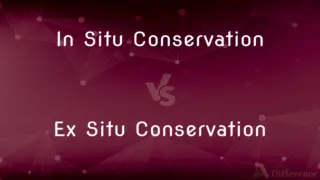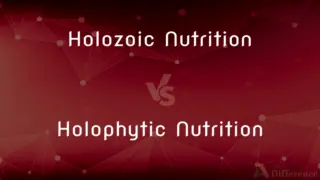Intrinsic Motivation vs. Extrinsic Motivation — What's the Difference?
Edited by Tayyaba Rehman — By Fiza Rafique — Published on December 23, 2023
Intrinsic Motivation comes from within, driven by personal satisfaction; Extrinsic Motivation is influenced by external rewards or punishments.

Difference Between Intrinsic Motivation and Extrinsic Motivation
Table of Contents
ADVERTISEMENT
Key Differences
Intrinsic Motivation refers to the drive that arises from within an individual, stemming from personal interests or inherent satisfaction. On the other hand, Extrinsic Motivation originates outside the individual, fueled by external factors.
Intrinsic Motivation is deeply tied to personal fulfillment and the joy of performing a task. Extrinsic Motivation, however, revolves around external incentives, such as bonuses, promotions, or avoiding penalties.
People with strong Intrinsic Motivation engage in activities because they find them inherently rewarding. In contrast, those driven by Extrinsic Motivation might act to gain a reward or avoid a negative outcome.
While Intrinsic Motivation can lead to long-lasting engagement and satisfaction in activities, Extrinsic Motivation might be temporary, often ceasing when the external factor is removed.
Both Intrinsic Motivation and Extrinsic Motivation play crucial roles in guiding behavior. However, it's essential to strike a balance, ensuring lasting engagement and reaching desired outcomes.
ADVERTISEMENT
Comparison Chart
Source
Comes from within the individual.
Comes from external factors.
Drive
Personal satisfaction and inherent reward.
External rewards or avoiding penalties.
Duration
Tends to be long-lasting.
Can be temporary; lasts as long as the external factor.
Examples
Joy of learning, personal growth.
Bonuses, promotions, grades.
Impact on Behavior
Leads to deep engagement and satisfaction.
Might lead to behavior change only for a short period.
Compare with Definitions
Intrinsic Motivation
A drive arising from personal satisfaction.
He studied not for grades but due to his Intrinsic Motivation for learning.
Extrinsic Motivation
Motivation influenced by external factors.
She participated in the contest due to the Extrinsic Motivation of winning the prize.
Intrinsic Motivation
Motivation rooted in personal interest.
Her love for painting is purely out of Intrinsic Motivation.
Extrinsic Motivation
Being motivated by outside elements, such as rewards.
Employee of the month titles serve as Extrinsic Motivation for many.
Intrinsic Motivation
Motivated by internal factors like joy or passion.
His Intrinsic Motivation for music drives him to practice daily.
Extrinsic Motivation
A desire to act to gain external incentives.
Students often study out of Extrinsic Motivation to achieve good grades.
Intrinsic Motivation
Engaging in behavior because it's inherently rewarding.
He volunteers at the shelter, driven by Intrinsic Motivation to help others.
Extrinsic Motivation
Acting based on external consequences.
To avoid a penalty, his Extrinsic Motivation pushed him to submit the project on time.
Intrinsic Motivation
A desire to act based on internal fulfillment.
She writes daily due to the Intrinsic Motivation of expressing herself.
Extrinsic Motivation
Driven by external rewards or penalties.
He works overtime primarily due to Extrinsic Motivation of earning a bonus.
Common Curiosities
What is Intrinsic Motivation?
Intrinsic Motivation comes from within an individual, based on personal satisfaction or interest.
Which motivation is more lasting?
Intrinsic Motivation tends to be more enduring since it's rooted in personal interests, while Extrinsic Motivation may cease when the reward is removed.
Can both types of motivation coexist?
Yes, individuals can be driven by both Intrinsic Motivation for personal fulfillment and Extrinsic Motivation for external rewards.
Why is Intrinsic Motivation important in learning?
Intrinsic Motivation fosters a love for learning, making the process more enjoyable and leading to deeper understanding.
How does Extrinsic Motivation impact the workplace?
Extrinsic Motivation, like bonuses or promotions, can boost productivity and ensure task completion, though it might be temporary.
How can one foster Intrinsic Motivation?
Engaging in activities that align with personal interests or finding intrinsic value in tasks can boost Intrinsic Motivation.
Can you give examples of Extrinsic Motivation?
Sure, grades in school, monetary bonuses, or avoiding penalties are examples.
Are rewards always Extrinsic Motivation?
No, if the reward is an internal feeling of accomplishment, it's intrinsic. However, tangible rewards like money are extrinsic.
How does Extrinsic Motivation differ?
Extrinsic Motivation is influenced by external rewards or consequences.
What are examples of Intrinsic Motivation?
Examples include passion for a hobby, love for learning, or personal growth.
Can Extrinsic Motivation lead to Intrinsic Motivation?
Potentially. Over time, an activity initially done for rewards might become internally rewarding.
How does understanding these motivations benefit teachers or employers?
By understanding Intrinsic and Extrinsic Motivation, one can better motivate and engage students or employees, leading to better outcomes.
Is one form of motivation better than the other?
Both have their place; Intrinsic Motivation often leads to lasting satisfaction, while Extrinsic Motivation can drive immediate action.
Why might Extrinsic Motivation not always work?
If individuals perceive the reward as controlling or if the reward is removed, the motivation can diminish.
Do all people have the same level of Intrinsic Motivation for tasks?
No, what's intrinsically motivating varies from person to person based on interests and values.
Share Your Discovery

Previous Comparison
In Situ Conservation vs. Ex Situ Conservation
Next Comparison
Holozoic Nutrition vs. Holophytic NutritionAuthor Spotlight
Written by
Fiza RafiqueFiza Rafique is a skilled content writer at AskDifference.com, where she meticulously refines and enhances written pieces. Drawing from her vast editorial expertise, Fiza ensures clarity, accuracy, and precision in every article. Passionate about language, she continually seeks to elevate the quality of content for readers worldwide.
Edited by
Tayyaba RehmanTayyaba Rehman is a distinguished writer, currently serving as a primary contributor to askdifference.com. As a researcher in semantics and etymology, Tayyaba's passion for the complexity of languages and their distinctions has found a perfect home on the platform. Tayyaba delves into the intricacies of language, distinguishing between commonly confused words and phrases, thereby providing clarity for readers worldwide.














































